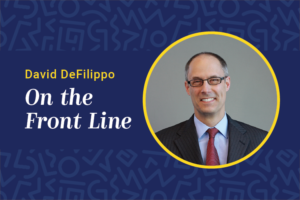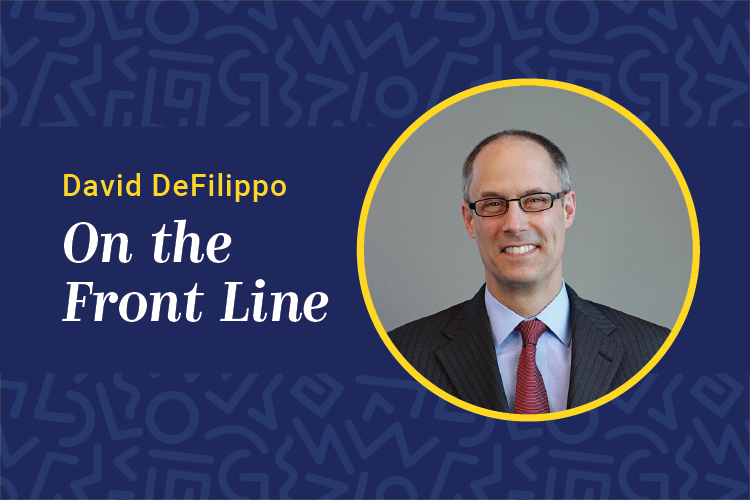 “Know thyself” is a principle inscribed at the Temple of Apollo at Delphi which dates its origins back to fourth century B.C. It is one of 147 expressions carved into the temple and perhaps the most well-known historically. This belief influenced the writings of Socrates as demonstrated by his focus on “self-knowledge” and the repeated usage in Plato’s writings to espouse individual self-awareness as a precondition to understanding the world. Tracing this aphorism’s historical roots into contemporary times, we see this value shared time after time in diverse works, such as Ben Franklin’s “Poor Richard’s Almanac” from 1750 — “There are three things extremely hard: steel, a diamond and to know one’s self”; Ralph Waldo Emerson’s poem “Gnothi Seauton” (translated “Know Thyself”); and even in the “Matrix” movie series with Neo’s quest to know himself in order to save mankind.
“Know thyself” is a principle inscribed at the Temple of Apollo at Delphi which dates its origins back to fourth century B.C. It is one of 147 expressions carved into the temple and perhaps the most well-known historically. This belief influenced the writings of Socrates as demonstrated by his focus on “self-knowledge” and the repeated usage in Plato’s writings to espouse individual self-awareness as a precondition to understanding the world. Tracing this aphorism’s historical roots into contemporary times, we see this value shared time after time in diverse works, such as Ben Franklin’s “Poor Richard’s Almanac” from 1750 — “There are three things extremely hard: steel, a diamond and to know one’s self”; Ralph Waldo Emerson’s poem “Gnothi Seauton” (translated “Know Thyself”); and even in the “Matrix” movie series with Neo’s quest to know himself in order to save mankind.
So, what gives with the Greek mythology lesson combined with a historical walk down memory lane and a review of one of the more memorable action film characters of the twentieth century?
As a longtime internal learning and talent practitioner and now as an executive coach, I spend a good amount of my time helping people gain and increase their self-awareness. This phase of the developmental coaching process is a precondition to focusing the work of making mindset shifts and taking visible actions based on this new awareness.
One of the perennial considerations that rises out of an individual’s increased self-awareness is that of career and job satisfaction. When working with and coaching executives, I regularly hear from individuals that they are not completely happy with their jobs or fulfilled by their roles even when they have seemingly climbed the ladder to a position of status. In explicating the reasons for this dissatisfaction, I regularly find that individual and organization career aspirations may not be fully aligned and risk remaining askew due to a lack of intentionality on the part of the person combined with tacit assumptions by the organization.
This misalignment may be rooted in Maslow’s well-known psychological theory that humans all have a unique hierarchy of needs which spans the basics of safety through the more complex journey to self-actualization. Further, with the current focus on the employee experience and workforce engagement, Tomas Chamorro-Premuzic, in an August 2019 Harvard Business Review article, posits that most people seek role mastery, team affiliation and a sense of purpose. While counterintuitive, the three criteria that Chamorro-Premuzic offers are often ignored by individuals due to compensation, “the devil you know” phenomenon and a lack of self-awareness about what they really want.
In these situations, the seemingly simple question that I ask individuals is, “What are your three criteria for job and career satisfaction?”
On the surface this question appears to be an easy one to address. However, the surprise that I have experienced over and over is that many people arrive at a place in their career and are not sure how or why they ended up there. With this lack of clarity, answering this question in a meaningful way is harder than one anticipates and is often the starting point for a conversation focused on closing the gap between current and future ambitions.
As someone who believes in taking my own prescriptions, here are my three conditions which I arrived at about 10 years into my career:
Meaningful purpose: being part of an organization or team with a well-articulated purpose combined with the intention and planning to achieve this outcome.
Experiencing the results: staying close enough to the people impacted by the purpose to realize and experience the impact that occurs.
Working with people similarly aligned: doing the first two with a team who share a similar passion and belief in the mission.
These have served as my career satisfaction yardsticks and have guided and informed my career choices, role decisions and, more recently, the clients I work with. So, in the spirit of Socrates and Plato, as well as the others influenced by the importance of knowing thyself, what are your three principles of career satisfaction?














